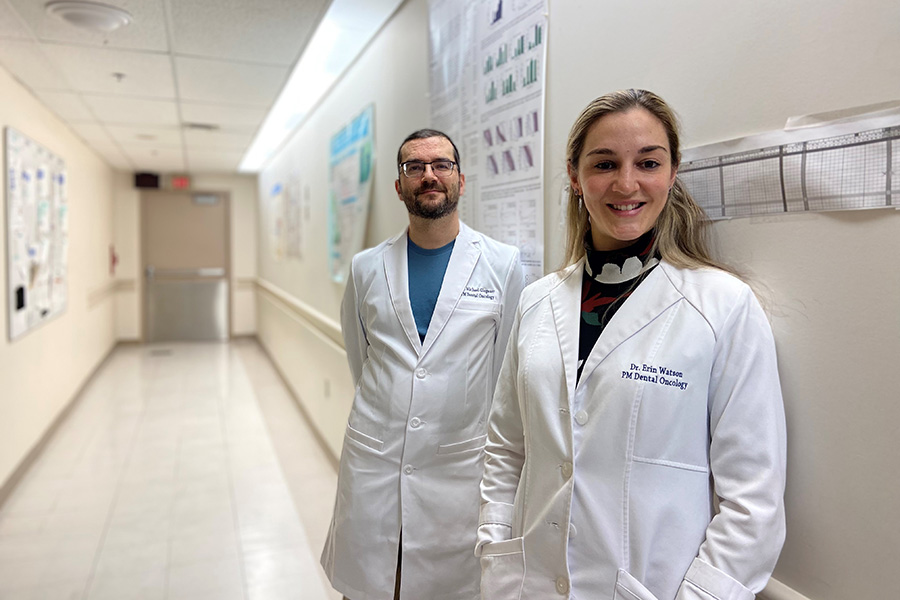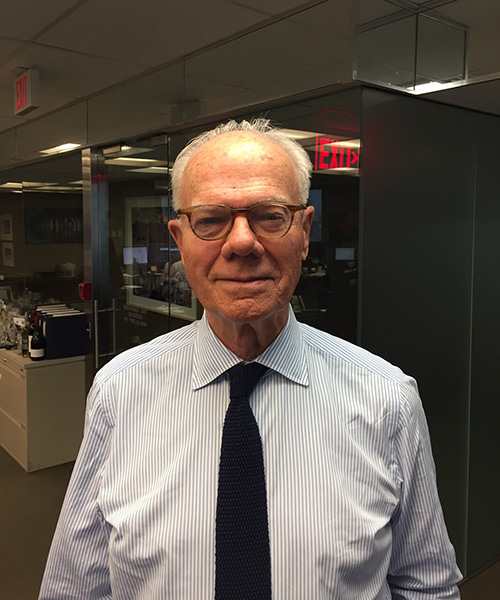
You may want to think twice next time you go to bed without flossing your teeth.
According to UHN's Dental Oncology team, poor oral hygiene can have a dramatic impact on your health in the future – particularly for patients diagnosed with cancer.
"People overlook the fact that the mouth is part of the body, so dentistry often gets overlooked in a patient's medical journey," says Dr. Michael Glogauer, Chief of Dentistry at UHN.
Dr. Glogauer says underlying tooth infections and gum disease can become a significant complication for immunocompromised or head and neck cancer patients, if left unaddressed. That's why Princess Margaret Cancer Centre provides specialized dental care to patients as part of their cancer therapy, to protect them from oral health complications that can potentially impair their quality of life.
"We focus on medically necessary dentistry where our treatment recommendations bridge the gap between the dental and the medical, taking into context a patient's whole medical history, including their cancer diagnosis and future journey," he says.
Dr. Erin Watson, Deputy Chief of Dentistry at UHN, says that while 60 per cent to 70 per cent of Canadians go to the dentist, many still have chronic mouth infections and don't know it, which can pose a significant risk to patients requiring radiation, chemotherapy or a transplant.
"The mouth is one of the only parts of the body that's in direct communication with the external environment, and because of that, we've developed a very robust immune system in our mouths that keeps these infections in check," she says.
These infections can become a problem for patients who are immunocompromised, because during that downtime, an undiagnosed dental problem that wasn't an issue before can suddenly flare up and cause illness at a time when it's not safe to perform dentistry.
"This can consequently affect the trajectory of a patient's treatment," Dr. Watson says.
Dr. Glogauer adds that some general dentists are less familiar with cancer-related complications, which can be detrimental — sometimes even life-altering — for cancer patients.
"One of our goals here is to educate dentists about the importance of being aware of their patients' whole medical history, and to get the word out about how preventative dentistry can improve quality of life in cancer survivors," he says.
Depending on the type of cancer and its treatment, Dr. Glogauer says dental complications may impact a cancer patient's quality of life during and after their therapy, especially if their dental health is not examined and optimized prior to starting treatment.
"Some patients will go to a dentist who is unfamiliar with the oral impact of cancer therapies, such as radiation to the head and neck, and how cancer therapy impacts long-term management of dental diseases," he says.
Radiation can affect saliva production, which can dry out the mouth and cause teeth to decay. Patients sometimes need to get these teeth removed years after completing their therapy without realizing the potential consequences.
"The problem is that jaws can lose their capacity to heal after head and neck radiation," Dr. Glogauer says, emphasizing that the major concern after such treatment is the risk of bone necrosis — death of the jawbone — which can fail to heal after tooth extractions.
To minimize this risk, head and neck cancer patients due to receive radiation that will affect their salivary tissue and jawbone are seen by the dental team prior to treatment. Careful management of dental issues before receiving radiation, along with increased awareness of the importance of ongoing dental health management, have significantly reduced the consequences of this treatment.
"This is why these dental surgical procedures are done in specialized units like ours, where we understand the risks and complications that can occur with cancer treatments," Dr. Glogauer says.
To help educate future dental care providers, Drs. Glogauer and Watson are leading the only dental oncology fellowship program in Canada at the University of Toronto, as well as a cancer and transplant-specific dental management night clinic for U of T Faculty of Dentistry students.
In addition to their efforts to improve the practice, they are also passionate about advocating for accessible dental care for cancer patients across Canada.
While the Princess Margaret's dental oncology program delivers world-class dentistry, there are many other patients who don't have the same access to care. OHIP pays for dental oncology examinations and extractions in hospitals, which isn't generally offered across the country.
Dr. Watson sits on the Ontario Dental Association Hospital Committee, where she can push for greater inclusion of dental oncology coverage in OHIP's billing processes. She and Dr. Glogauer also helped create a provincial working group with Cancer Care Ontario titled Dental Services for Oncology Patients, where they hope to drive provincial change in access to dental services for certain cancer patients.
"All these gaps that exist have been identified, and we've gone to multiple levels of government to address it in a substantial way," Dr. Watson says. "I've dedicated my career to bridging the care gap, and if that's the one thing I've managed to do by the end of it — I would be very happy."

Peter Dey is a former patient at Princess Margaret Cancer Centre and adjunct professor at the University of Toronto's Rotman School of Business. (Photo: UHN)
Peter Dey, a former patient at Princess Margaret Cancer Centre, knows first-hand just how dedicated and hard-working Drs. Glogauer and Watson are when it comes to their work and improving patient care.
"I felt I was in the hands of the most experienced team I could imagine, and that inspired me to have a very strong, positive belief that I was going to be okay," says Peter, who was diagnosed with throat cancer in 2019. He had two extractions and subsequent implants following chemotherapy.
Now cancer-free, Peter contrasts his experience with his dental implants to that of his knee replacement, where he found himself struggling to find the confidence to continue his passion for skiing.
"I never had that lack of confidence when it came to my implants and eating solid foods again," Peter says, emphasizing that his positive outlook had to do with the trust he had in the people taking care of him. Peter recalls that Dr. Glogauer even called him on weekends to see how he was doing, something he says is rare in the service sector.
"I could tell they really liked what they do, and that's important, because they really cared about me," he says. "I am a firm believer that healing can be enhanced in a positive environment.
"The people at the Princess Margaret knew this, and worked hard towards creating a positive, and even happy atmosphere."
While Peter still needs to get his crowns touched up, he wants anyone with a cancer diagnosis and dental health complications to know that the Princess Margaret is the place to be.
"I have not paid the necessary attention to my dental hygiene, and now I'm paying the price," he says.
"But the good news is: I'm getting excellent advice, and I couldn't ask for more."
This story first appeared on UHN News